homepage news
Top 10 local news stories of 2015
A new mayor, a papal visit and more
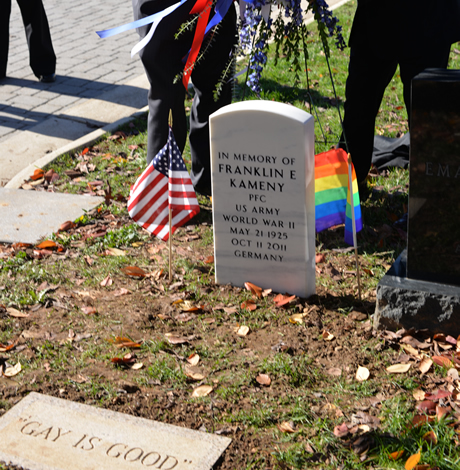
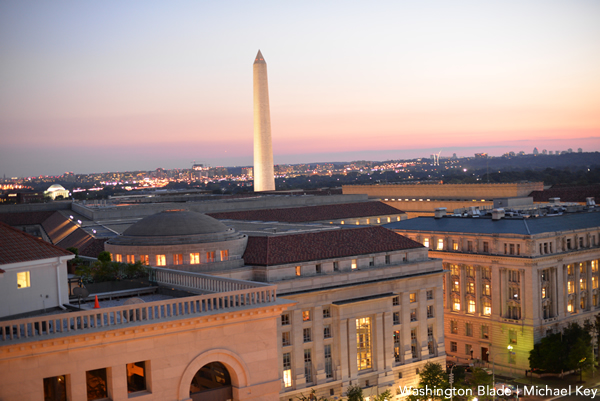
(Washington Blade photo by Michael Key)
Below are the Blade’s staff picks for the top 10 local stories of the year.
#10 Gay Republican wins race for D.C. GOP chair
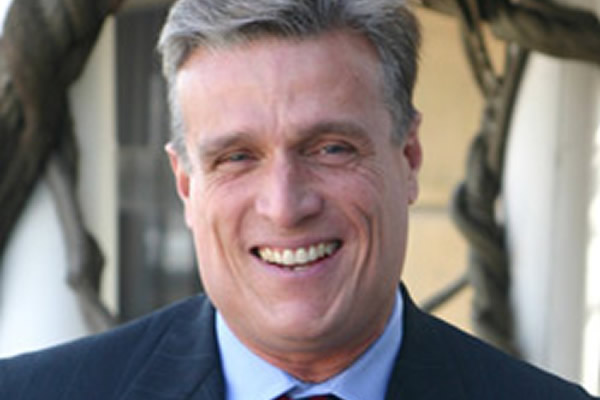
Jose Cunningham (Photo courtesy of Cunningham)
Jose Cunningham, a local gay Republican activist and prominent GOP fundraiser, won an upset victory in his race for chair of the D.C. Republican Committee in January 2015, beating incumbent chair Ron Phillips by a vote of 74 to 41.
Cunningham ran on a platform calling for the DCRC to take more aggressive steps to expand the membership of the D.C. Republican Party and recruit more qualified candidates for public office in a city with an overwhelmingly Democratic electorate.
The DCRC, which serves as the D.C. Republican Party’s governing body, has been supportive of LGBT rights, including marriage equality, for a number of years, placing it at odds with the national Republican Party.
In his role as the DCRC chair, Cunningham has an automatic seat on the Republican National Committee. Among other things, he has said he would push for removing anti-gay language from the national party’s platform at the 2016 Republican National Convention.
#9 Kameny memorial unveiled
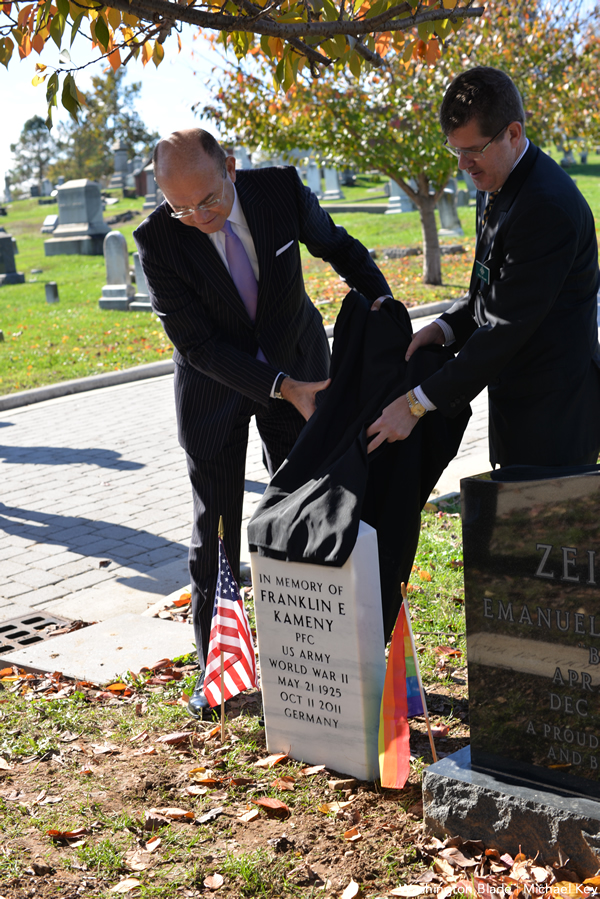
The Frank Kameny memorial stone was revealed on Veterans Day at Congressional Cemetery. (Washington Blade photo by Michael Key)
A four-year saga surrounding efforts to secure a D.C. memorial site for gay rights pioneer Frank Kameny ended in November with a ceremony dedicating a memorial headstone in his honor at Congressional Cemetery.
Four gay members of the Army and one from the Navy stood at attention in full dress uniform as U.S. Air Force General Counsel Gordon O. Tanner, who’s gay, and Congressional Cemetery President Paul Williams unveiled the newly installed Kameny headstone.
The headstone along with a footstone bearing the slogan, “Gay is Good,” which Kameny coined in 1968, were placed at a cemetery plot just behind the gravesite of gay Air Force Sgt. Leonard Matlovich. With Kameny’s advice and coaching, Matlovich disclosed he was gay in 1975, becoming the first active duty U.S. service member to challenge the military’s ban on gays.
The dedication of the Kameny memorial site came just over four years after he died on National Coming Out Day on Oct. 11, 2011. He died of natural causes at his Washington home at the age of 86.
#8 D.C. judge criticized for ‘lenient’ sentence in hate crime
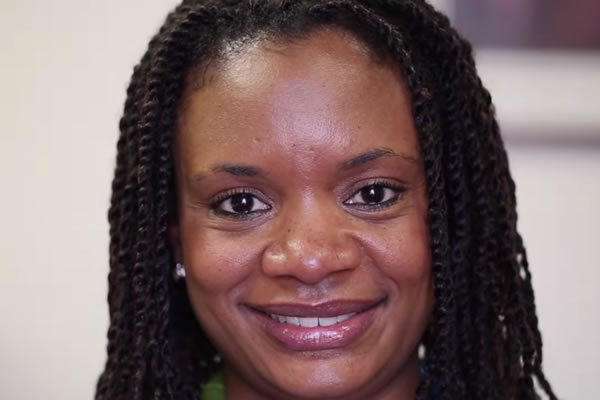
Judge Yvonne Williams (Image courtesy YouTube)
A D.C. Superior Court judge surprised court observers in August by rescinding an earlier decision to lower the sentence she gave to one of two defendants convicted of committing an anti-gay assault.
Judge Yvonne Williams, responding to objections by prosecutors, issued an order vacating her earlier order of July 15 that lowered the sentence for lesbian Christina Lucas, 22, from one year to six months in prison.
Lucas and her twin brother, Christopher Lucas, were convicted by a jury following a two-week trial on a charge of aggravated assault while armed with a hate crime designation. The case is the same one in which a grand jury took the unusual step of designating the assault as a hate crime, even though prosecutors didn’t ask it to do so.
Judge Williams came under fire from LGBT activists after stating in a post-trial hearing that she didn’t believe the two defendants should receive anywhere near the 15-year prison term recommended by prosecutors because the victim’s injuries were not serious enough. Prosecutors argued that the beating initiated by Christina Lucas and carried out by her brother and other men with them could have resulted in the victim’s death.
Williams drew further criticism by LGBT activists when she said she didn’t believe Christina Lucas could be accused of committing an anti-gay hate crime because she’s gay.
#7 ‘Runaway’ jury rebukes U.S. Attorney
A former member of a D.C. Superior Court grand jury disclosed in July that grand jurors took the unusual step of handing down a hate crime indictment in an anti-gay assault case after prosecutors with the U.S. Attorney’s Office did not recommend that the case be listed as a hate crime.
The former grand juror, who spoke on condition of not being identified, said witnesses, including a D.C. police detective and the gay male victim, told the grand jury in August 2014 that then 20-year-old Christina Lucas and her twin brother, Christopher Lucas, knocked the gay male victim to the ground and punched and kicked him while shouting anti-gay names.
A police report says witnesses told police that Christina Lucas slashed the victim’s face with a sharp object while he was lying on the ground shortly after calling him a “faggot motherfucker.”
A spokesperson for the U.S. Attorney’s Office said the office was barred by law from commenting on any aspect of grand jury deliberations, which by law must remain confidential. In May 2015, a Superior Court jury found the Lucas siblings guilty of aggravated assault while armed with a hate crime designation following a two-week trial. A judge sentenced the twins to one year in jail and five years of supervised probation upon their release, a sentence that law enforcement sources criticized as too lenient.
#6 Gay candidates win Va. House, College Park mayor races
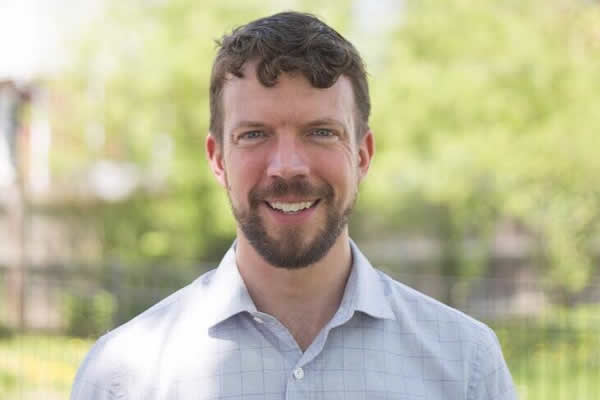
Patrick Wojahn (Photo courtesy Wojahn)
Gay rights attorney and former congressional staffer Mark Levine won election in November to a seat in the Virginia House of Delegates, becoming the third out gay member of the Virginia Legislature.
On the same day, gay attorney and College Park, Md., City Council member Patrick Wojahn won election as College Park mayor, becoming the first gay person to serve as that city’s mayor. Wojahn beat fellow Council member Denise Mitchell in a two-person race for the mayoral post.
Levine, a Democrat, ran unopposed in the November general election in an overwhelmingly Democratic district that includes parts of the city of Alexandria and Fairfax County. He won an upset victory in the June Democratic primary in a five-candidate race, finishing ahead of Alexandria government official Craig Fifer, who was considered by political observers to be the frontrunner, by a margin of 27.8 percent to 24.3 percent.
#5 D.C. trans residents face ‘devastating’ poverty
Two studies of D.C.’s transgender community released in November found that similar to other parts of the country, trans people living in the District continue to experience “devastatingly high rates” of poverty, unemployment, employment discrimination and health disparities.
The findings of one of the studies, compiled from the largest-ever city-based survey of transgender people, were released in a 116-page report called “Access Denied: 2015 Washington, D.C. Trans Needs Assessment Report.”
Among other things, the survey found that 46 percent of the trans people living in D.C. participating in the survey earned less than $10,000 a year, with 57 percent of trans people of color making below $10,000.
The second study was conducted by the D.C. Office of Human Rights. It found that 48 percent of employers “tested” by the office appeared to prefer at least one less-qualified job applicant over a better qualified applicant perceived as being transgender.
OHR said the testing consisted of sending 200 made up cover letters and resumes prepared by OHR to 38 employers that advertised 50 individual job openings. One set of cover letters and resumes were written to give the impression the applicant was a transgender person, with the other set portraying the applicant as cisgender.
Details of the study along with its finding are compiled in a 28-page report called “Qualified and Transgender: A Report on Results of Resume Testing for Employment Discrimination Based on Gender Identity.”
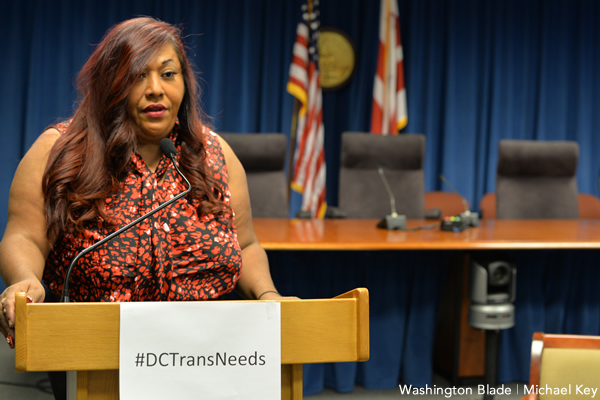
Ruby Corado presents findings at the Wilson Building on Nov. 13, 2015. (Washington Blade photo by Michael Key)
#4 ‘Gay pickup’ murder of lawyer at Donovan Hotel
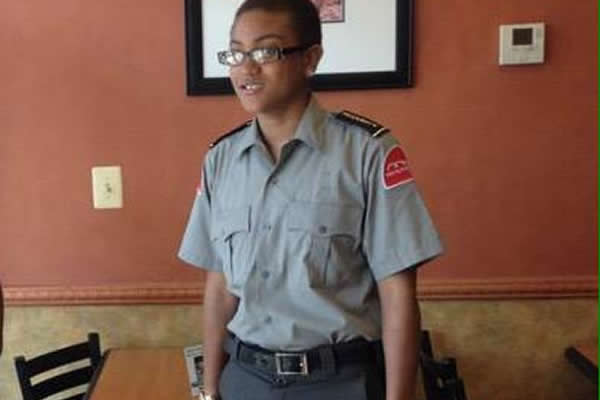
Jamyra Gallmon (Photo courtesy of MVP Protective Services)
A D.C. woman who pled guilty in May to second-degree murder while armed for fatally stabbing 30-year-old attorney David Messerschmitt at the city’s Donovan Hotel on Feb. 9 was sentenced in August to 24 years in prison.
Jamyra Gallmon, 21, confessed to police that she targeted Messerschmitt for a robbery by pretending to be a man while answering an ad he placed on Craigslist seeking to meet another man for sex.
Police and prosecutors said she stabbed Messerschmitt at least seven times in the chest, groin area, arm and back when he attempted to fight back after she entered his hotel room and started to rob him of his possessions.
Hotel employees found Messerschmitt’s body in his room several hours after his wife reported him missing. LGBT activists said the case was a sad reminder that closeted gay men married to women sometimes fall victim to a phenomenon that has long plagued out gay men known as gay pickup murders.
#3 Trans woman named head of D.C. Police GLLU
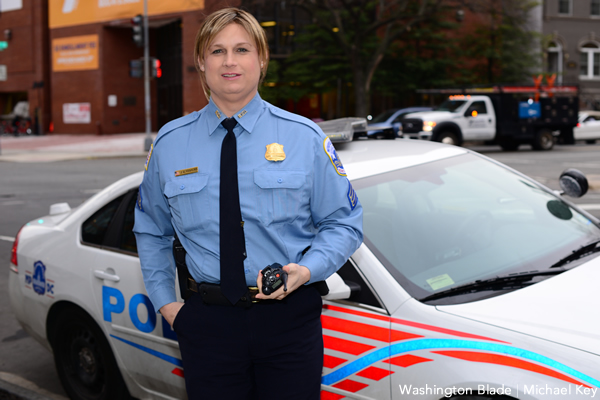
Sgt. Jessica Hawkins heads the GLLU. (Washington Blade photo by Michael Key)
D.C. Police Chief Cathy Lanier in March named Sgt. Jessica Hawkins, an out transgender woman, as supervisor of the department’s Gay and Lesbian Liaison Unit. Hawkins became the first transgender person to hold that position.
In an interview with the Blade, Hawkins said she planned to build on what she said was a strong foundation for the unit begun by her predecessors, including Sgt. Brett Parson.
Hawkins assumed her position at a time when some LGBT activists expressed concern that Lanier had reduced the GLLU’s effectiveness by assigning its officers to non-GLLU related duties for as much as half of each work shift. Police officials said the chief had made similar reassignments for members of most other specialized police units due to a shortage of officers brought about by a recent retirement “bubble” in which more officers are retiring than can be replaced by new recruits.
“My officers are dedicated,” Hawkins said. “We will make sure that when any GLLU call comes out they are going to respond to it.”
#2 Pope’s D.C. gay friend speaks out after Pontiff’s visit
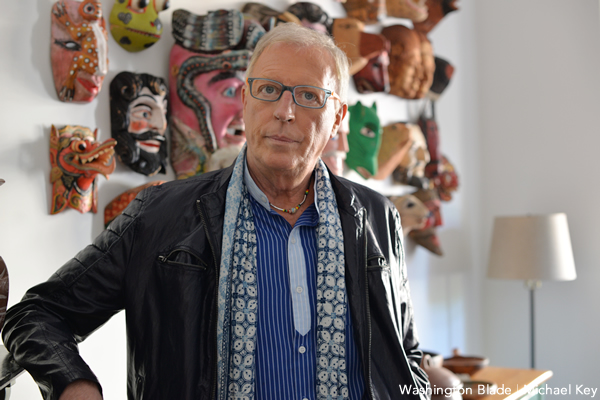
Yayo Grassi and his boyfriend met with Pope Francis. (Washington Blade photo by Michael Key)
D.C. resident Yayo Grassi, a native of Argentina, made international headlines in September when news surfaced that he and his boyfriend of 19 years met with Pope Francis at the Vatican Embassy in Washington during the Pope’s visit to the United States.
Grassi, 67, the owner of a D.C.-based catering business, said he has known and admired Francis since the future Pontiff was his high school teacher at a Catholic school in Argentina.
His and his boyfriend’s visit with the Pope drew media attention because it took place shortly after Kim Davis, the county clerk in Kentucky who refused to issue marriage licenses for same-sex couples on religious grounds, announced that she had met with Francis at the Vatican Embassy.
Following a flurry of criticism that the Pope appeared to be condoning anti-gay discrimination by associating with Davis, the Vatican issued a statement saying Davis was part a group of visitors at the embassy and had not been personally invited by the Pope. According to the statement, Grassi and his family members were the only ones directly invited by Francis for a personal audience during the Pontiff’s Washington visit.
Grassi said he believes the Pope is making a genuine effort to change the church for the better for LGBT people.
#1 Bowser takes office, names 5 gays to Cabinet
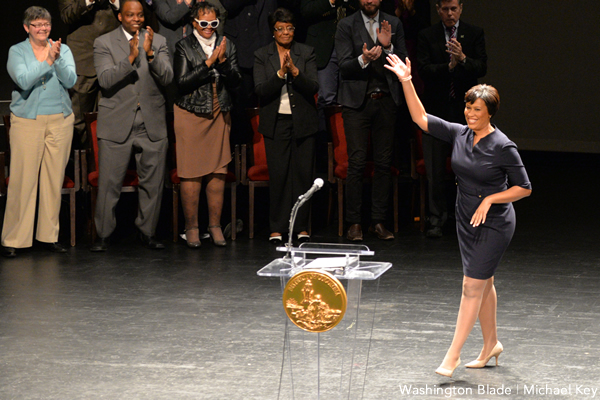
Mayor Muriel Bowser at State of the District Address on March 31, 2015. (Washington Blade photo by Michael Key)
In her first four months in office D.C. Mayor Muriel Bowser appointed five out gays or lesbians to cabinet-level positions, including a first-ever appointment of a lesbian as deputy mayor.
In April, Bowser named lesbian activist and public affairs lobbyist Courtney Snowden as Deputy Mayor for Greater Economic Opportunity, a newly created position in the Executive Office of the Mayor. The position involves coordinating the city’s efforts to “create pathways to the middle class for residents in every corner of the city,” Bowser said.
The other appointees included veteran lesbian activist and media professional Sheila Alexander Reid as director of the Mayor’s Office of LGBTQ Affairs; gay urban planning specialist David Do as director of the Mayor’s Office of Asian and Pacific Islander Affairs; lesbian housing and homelessness policy expert Polly Donaldson as director of the D.C. Department of Housing and Community Development, and gay former city official Matt Brown as director of the Mayor’s Office of the Budget.
homepage news
Honoring the legacy of New Orleans’ 1973 UpStairs Lounge fire
Why the arson attack that killed 32 gay men still resonates 50 years later

On June 23 of last year, I held the microphone as a gay man in the New Orleans City Council Chamber and related a lost piece of queer history to the seven council members. I told this story to disabuse all New Orleanians of the notion that silence and accommodation, in the face of institutional and official failures, are a path to healing.
The story I related to them began on a typical Sunday night at a second-story bar on the fringe of New Orleans’ French Quarter in 1973, where working-class men would gather around a white baby grand piano and belt out the lyrics to a song that was the anthem of their hidden community, “United We Stand” by the Brotherhood of Man.
“United we stand,” the men would sing together, “divided we fall” — the words epitomizing the ethos of their beloved UpStairs Lounge bar, an egalitarian free space that served as a forerunner to today’s queer safe havens.
Around that piano in the 1970s Deep South, gays and lesbians, white and Black queens, Christians and non-Christians, and even early gender minorities could cast aside the racism, sexism, and homophobia of the times to find acceptance and companionship for a moment.
For regulars, the UpStairs Lounge was a miracle, a small pocket of acceptance in a broader world where their very identities were illegal.
On the Sunday night of June 24, 1973, their voices were silenced in a murderous act of arson that claimed 32 lives and still stands as the deadliest fire in New Orleans history — and the worst mass killing of gays in 20th century America.
As 13 fire companies struggled to douse the inferno, police refused to question the chief suspect, even though gay witnesses identified and brought the soot-covered man to officers idly standing by. This suspect, an internally conflicted gay-for-pay sex worker named Rodger Dale Nunez, had been ejected from the UpStairs Lounge screaming the word “burn” minutes before, but New Orleans police rebuffed the testimony of fire survivors on the street and allowed Nunez to disappear.
As the fire raged, police denigrated the deceased to reporters on the street: “Some thieves hung out there, and you know this was a queer bar.”
For days afterward, the carnage met with official silence. With no local gay political leaders willing to step forward, national Gay Liberation-era figures like Rev. Troy Perry of the Metropolitan Community Church flew in to “help our bereaved brothers and sisters” — and shatter officialdom’s code of silence.
Perry broke local taboos by holding a press conference as an openly gay man. “It’s high time that you people, in New Orleans, Louisiana, got the message and joined the rest of the Union,” Perry said.
Two days later, on June 26, 1973, as families hesitated to step forward to identify their kin in the morgue, UpStairs Lounge owner Phil Esteve stood in his badly charred bar, the air still foul with death. He rebuffed attempts by Perry to turn the fire into a call for visibility and progress for homosexuals.
“This fire had very little to do with the gay movement or with anything gay,” Esteve told a reporter from The Philadelphia Inquirer. “I do not want my bar or this tragedy to be used to further any of their causes.”
Conspicuously, no photos of Esteve appeared in coverage of the UpStairs Lounge fire or its aftermath — and the bar owner also remained silent as he witnessed police looting the ashes of his business.
“Phil said the cash register, juke box, cigarette machine and some wallets had money removed,” recounted Esteve’s friend Bob McAnear, a former U.S. Customs officer. “Phil wouldn’t report it because, if he did, police would never allow him to operate a bar in New Orleans again.”
The next day, gay bar owners, incensed at declining gay bar traffic amid an atmosphere of anxiety, confronted Perry at a clandestine meeting. “How dare you hold your damn news conferences!” one business owner shouted.
Ignoring calls for gay self-censorship, Perry held a 250-person memorial for the fire victims the following Sunday, July 1, culminating in mourners defiantly marching out the front door of a French Quarter church into waiting news cameras. “Reverend Troy Perry awoke several sleeping giants, me being one of them,” recalled Charlene Schneider, a lesbian activist who walked out of that front door with Perry.

Esteve doubted the UpStairs Lounge story’s capacity to rouse gay political fervor. As the coroner buried four of his former patrons anonymously on the edge of town, Esteve quietly collected at least $25,000 in fire insurance proceeds. Less than a year later, he used the money to open another gay bar called the Post Office, where patrons of the UpStairs Lounge — some with visible burn scars — gathered but were discouraged from singing “United We Stand.”
New Orleans cops neglected to question the chief arson suspect and closed the investigation without answers in late August 1973. Gay elites in the city’s power structure began gaslighting the mourners who marched with Perry into the news cameras, casting suspicion on their memories and re-characterizing their moment of liberation as a stunt.
When a local gay journalist asked in April 1977, “Where are the gay activists in New Orleans?,” Esteve responded that there were none, because none were needed. “We don’t feel we’re discriminated against,” Esteve said. “New Orleans gays are different from gays anywhere else… Perhaps there is some correlation between the amount of gay activism in other cities and the degree of police harassment.”

An attitude of nihilism and disavowal descended upon the memory of the UpStairs Lounge victims, goaded by Esteve and fellow gay entrepreneurs who earned their keep via gay patrons drowning their sorrows each night instead of protesting the injustices that kept them drinking.
Into the 1980s, the story of the UpStairs Lounge all but vanished from conversation — with the exception of a few sanctuaries for gay political debate such as the local lesbian bar Charlene’s, run by the activist Charlene Schneider.
By 1988, the 15th anniversary of the fire, the UpStairs Lounge narrative comprised little more than a call for better fire codes and indoor sprinklers. UpStairs Lounge survivor Stewart Butler summed it up: “A tragedy that, as far as I know, no good came of.”
Finally, in 1991, at Stewart Butler and Charlene Schneider’s nudging, the UpStairs Lounge story became aligned with the crusade of liberated gays and lesbians seeking equal rights in Louisiana. The halls of power responded with intermittent progress. The New Orleans City Council, horrified by the story but not yet ready to take its look in the mirror, enacted an anti-discrimination ordinance protecting gays and lesbians in housing, employment, and public accommodations that Dec. 12 — more than 18 years after the fire.
“I believe the fire was the catalyst for the anger to bring us all to the table,” Schneider told The Times-Picayune, a tacit rebuke to Esteve’s strategy of silent accommodation. Even Esteve seemed to change his stance with time, granting a full interview with the first UpStairs Lounge scholar Johnny Townsend sometime around 1989.
Most of the figures in this historic tale are now deceased. What’s left is an enduring story that refused to go gently. The story now echoes around the world — a musical about the UpStairs Lounge fire recently played in Tokyo, translating the gay underworld of the 1973 French Quarter for Japanese audiences.
When I finished my presentation to the City Council last June, I looked up to see the seven council members in tears. Unanimously, they approved a resolution acknowledging the historic failures of city leaders in the wake of the UpStairs Lounge fire.
Council members personally apologized to UpStairs Lounge families and survivors seated in the chamber in a symbolic act that, though it could not bring back those who died, still mattered greatly to those whose pain had been denied, leaving them to grieve alone. At long last, official silence and indifference gave way to heartfelt words of healing.
The way Americans remember the past is an active, ongoing process. Our collective memory is malleable, but it matters because it speaks volumes about our maturity as a people, how we acknowledge the past’s influence in our lives, and how it shapes the examples we set for our youth. Do we grapple with difficult truths, or do we duck accountability by defaulting to nostalgia and bluster? Or worse, do we simply ignore the past until it fades into a black hole of ignorance and indifference?
I believe that a factual retelling of the UpStairs Lounge tragedy — and how, 50 years onward, it became known internationally — resonates beyond our current divides. It reminds queer and non-queer Americans that ignoring the past holds back the present, and that silence is no cure for what ails a participatory nation.
Silence isolates. Silence gaslights and shrouds. It preserves the power structures that scapegoat the disempowered.
Solidarity, on the other hand, unites. Solidarity illuminates a path forward together. Above all, solidarity transforms the downtrodden into a resounding chorus of citizens — in the spirit of voices who once gathered ‘round a white baby grand piano and sang, joyfully and loudly, “United We Stand.”

Robert W. Fieseler is a New Orleans-based journalist and the author of “Tinderbox: the Untold Story of the Up Stairs Lounge Fire and the Rise of Gay Liberation.”
homepage news
New Supreme Court term includes critical LGBTQ case with ‘terrifying’ consequences
Business owner seeks to decline services for same-sex weddings

The U.S. Supreme Court, after a decision overturning Roe v. Wade that still leaves many reeling, is starting a new term with justices slated to revisit the issue of LGBTQ rights.
In 303 Creative v. Elenis, the court will return to the issue of whether or not providers of custom-made goods can refuse service to LGBTQ customers on First Amendment grounds. In this case, the business owner is Lorie Smith, a website designer in Colorado who wants to opt out of providing her graphic design services for same-sex weddings despite the civil rights law in her state.
Jennifer Pizer, acting chief legal officer of Lambda Legal, said in an interview with the Blade, “it’s not too much to say an immeasurably huge amount is at stake” for LGBTQ people depending on the outcome of the case.
“This contrived idea that making custom goods, or offering a custom service, somehow tacitly conveys an endorsement of the person — if that were to be accepted, that would be a profound change in the law,” Pizer said. “And the stakes are very high because there are no practical, obvious, principled ways to limit that kind of an exception, and if the law isn’t clear in this regard, then the people who are at risk of experiencing discrimination have no security, no effective protection by having a non-discrimination laws, because at any moment, as one makes their way through the commercial marketplace, you don’t know whether a particular business person is going to refuse to serve you.”
The upcoming arguments and decision in the 303 Creative case mark a return to LGBTQ rights for the Supreme Court, which had no lawsuit to directly address the issue in its previous term, although many argued the Dobbs decision put LGBTQ rights in peril and threatened access to abortion for LGBTQ people.
And yet, the 303 Creative case is similar to other cases the Supreme Court has previously heard on the providers of services seeking the right to deny services based on First Amendment grounds, such as Masterpiece Cakeshop and Fulton v. City of Philadelphia. In both of those cases, however, the court issued narrow rulings on the facts of litigation, declining to issue sweeping rulings either upholding non-discrimination principles or First Amendment exemptions.
Pizer, who signed one of the friend-of-the-court briefs in opposition to 303 Creative, said the case is “similar in the goals” of the Masterpiece Cakeshop litigation on the basis they both seek exemptions to the same non-discrimination law that governs their business, the Colorado Anti-Discrimination Act, or CADA, and seek “to further the social and political argument that they should be free to refuse same-sex couples or LGBTQ people in particular.”
“So there’s the legal goal, and it connects to the social and political goals and in that sense, it’s the same as Masterpiece,” Pizer said. “And so there are multiple problems with it again, as a legal matter, but also as a social matter, because as with the religion argument, it flows from the idea that having something to do with us is endorsing us.”
One difference: the Masterpiece Cakeshop litigation stemmed from an act of refusal of service after owner, Jack Phillips, declined to make a custom-made wedding cake for a same-sex couple for their upcoming wedding. No act of discrimination in the past, however, is present in the 303 Creative case. The owner seeks to put on her website a disclaimer she won’t provide services for same-sex weddings, signaling an intent to discriminate against same-sex couples rather than having done so.
As such, expect issues of standing — whether or not either party is personally aggrieved and able bring to a lawsuit — to be hashed out in arguments as well as whether the litigation is ripe for review as justices consider the case. It’s not hard to see U.S. Chief Justice John Roberts, who has sought to lead the court to reach less sweeping decisions (sometimes successfully, and sometimes in the Dobbs case not successfully) to push for a decision along these lines.
Another key difference: The 303 Creative case hinges on the argument of freedom of speech as opposed to the two-fold argument of freedom of speech and freedom of religious exercise in the Masterpiece Cakeshop litigation. Although 303 Creative requested in its petition to the Supreme Court review of both issues of speech and religion, justices elected only to take up the issue of free speech in granting a writ of certiorari (or agreement to take up a case). Justices also declined to accept another question in the petition request of review of the 1990 precedent in Smith v. Employment Division, which concluded states can enforce neutral generally applicable laws on citizens with religious objections without violating the First Amendment.
Representing 303 Creative in the lawsuit is Alliance Defending Freedom, a law firm that has sought to undermine civil rights laws for LGBTQ people with litigation seeking exemptions based on the First Amendment, such as the Masterpiece Cakeshop case.
Kristen Waggoner, president of Alliance Defending Freedom, wrote in a Sept. 12 legal brief signed by her and other attorneys that a decision in favor of 303 Creative boils down to a clear-cut violation of the First Amendment.
“Colorado and the United States still contend that CADA only regulates sales transactions,” the brief says. “But their cases do not apply because they involve non-expressive activities: selling BBQ, firing employees, restricting school attendance, limiting club memberships, and providing room access. Colorado’s own cases agree that the government may not use public-accommodation laws to affect a commercial actor’s speech.”
Pizer, however, pushed back strongly on the idea a decision in favor of 303 Creative would be as focused as Alliance Defending Freedom purports it would be, arguing it could open the door to widespread discrimination against LGBTQ people.
“One way to put it is art tends to be in the eye of the beholder,” Pizer said. “Is something of a craft, or is it art? I feel like I’m channeling Lily Tomlin. Remember ‘soup and art’? We have had an understanding that whether something is beautiful or not is not the determining factor about whether something is protected as artistic expression. There’s a legal test that recognizes if this is speech, whose speech is it, whose message is it? Would anyone who was hearing the speech or seeing the message understand it to be the message of the customer or of the merchants or craftsmen or business person?”
Despite the implications in the case for LGBTQ rights, 303 Creative may have supporters among LGBTQ people who consider themselves proponents of free speech.
One joint friend-of-the-court brief before the Supreme Court, written by Dale Carpenter, a law professor at Southern Methodist University who’s written in favor of LGBTQ rights, and Eugene Volokh, a First Amendment legal scholar at the University of California, Los Angeles, argues the case is an opportunity to affirm the First Amendment applies to goods and services that are uniquely expressive.
“Distinguishing expressive from non-expressive products in some contexts might be hard, but the Tenth Circuit agreed that Smith’s product does not present a hard case,” the brief says. “Yet that court (and Colorado) declined to recognize any exemption for products constituting speech. The Tenth Circuit has effectively recognized a state interest in subjecting the creation of speech itself to antidiscrimination laws.”
Oral arguments in the case aren’t yet set, but may be announced soon. Set to defend the state of Colorado and enforcement of its non-discrimination law in the case is Colorado Solicitor General Eric Reuel Olson. Just this week, the U.S. Supreme Court announced it would grant the request to the U.S. solicitor general to present arguments before the justices on behalf of the Biden administration.
With a 6-3 conservative majority on the court that has recently scrapped the super-precedent guaranteeing the right to abortion, supporters of LGBTQ rights may think the outcome of the case is all but lost, especially amid widespread fears same-sex marriage would be next on the chopping block. After the U.S. Tenth Circuit Court of Appeals ruled against 303 Creative in the lawsuit, the simple action by the Supreme Court to grant review in the lawsuit suggests they are primed to issue a reversal and rule in favor of the company.
Pizer, acknowledging the call to action issued by LGBTQ groups in the aftermath of the Dobbs decision, conceded the current Supreme Court issuing the ruling in this case is “a terrifying prospect,” but cautioned the issue isn’t so much the makeup of the court but whether or not justices will continue down the path of abolishing case law.
“I think the question that we’re facing with respect to all of the cases or at least many of the cases that are in front of the court right now, is whether this court is going to continue on this radical sort of wrecking ball to the edifice of settled law and seemingly a goal of setting up whole new structures of what our basic legal principles are going to be. Are we going to have another term of that?” Pizer said. “And if so, that’s terrifying.”
homepage news
Kelley Robinson, a Black, queer woman, named president of Human Rights Campaign
Progressive activist a veteran of Planned Parenthood Action Fund

Kelley Robinson, a Black, queer woman and veteran of Planned Parenthood Action Fund, is to become the next president of the Human Rights Campaign, the nation’s leading LGBTQ group announced on Tuesday.
Robinson is set to become the ninth president of the Human Rights Campaign after having served as executive director of Planned Parenthood Action Fund and more than 12 years of experience as a leader in the progressive movement. She’ll be the first Black, queer woman to serve in that role.
“I’m honored and ready to lead HRC — and our more than three million member-advocates — as we continue working to achieve equality and liberation for all Lesbian, Gay, Bisexual, Transgender, and Queer people,” Robinson said. “This is a pivotal moment in our movement for equality for LGBTQ+ people. We, particularly our trans and BIPOC communities, are quite literally in the fight for our lives and facing unprecedented threats that seek to destroy us.”
The next Human Rights Campaign president is named as Democrats are performing well in polls in the mid-term elections after the U.S. Supreme Court overturned Roe v. Wade, leaving an opening for the LGBTQ group to play a key role amid fears LGBTQ rights are next on the chopping block.
“The overturning of Roe v. Wade reminds us we are just one Supreme Court decision away from losing fundamental freedoms including the freedom to marry, voting rights, and privacy,” Robinson said. “We are facing a generational opportunity to rise to these challenges and create real, sustainable change. I believe that working together this change is possible right now. This next chapter of the Human Rights Campaign is about getting to freedom and liberation without any exceptions — and today I am making a promise and commitment to carry this work forward.”
The Human Rights Campaign announces its next president after a nearly year-long search process after the board of directors terminated its former president Alphonso David when he was ensnared in the sexual misconduct scandal that led former New York Gov. Andrew Cuomo to resign. David has denied wrongdoing and filed a lawsuit against the LGBTQ group alleging racial discrimination.

-

 Africa4 days ago
Africa4 days agoCongolese lawmaker introduces anti-homosexuality bill
-

 World4 days ago
World4 days agoOut in the World: LGBTQ news from Europe and Asia
-

 District of Columbia3 days ago
District of Columbia3 days agoReenactment of first gay rights picket at White House set for April 17
-

 Africa3 days ago
Africa3 days agoUgandan activists appeal ruling that upheld Anti-Homosexuality Act












